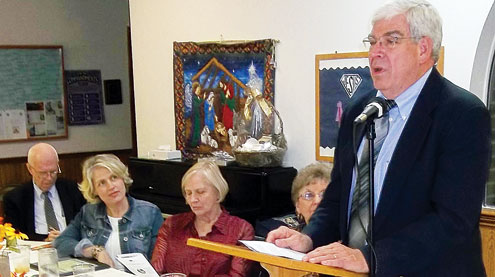Audience Hears Mark Twain, Champ Clark Connection
When one of America’s greatest writers wanted a monumental legal change, he turned to one of the nation’s most astute politicians.
Mark Twain and Champ Clark became friends after the author campaigned so well for better copyright law that the legislator called him “the prince of lobbyists.”
Members and guests of Champ Clark Honey Shuck Restoration Inc. heard about the unlikely connection Oct. 26 from Mark Twain Boyhood Home and Museum Executive Director Henry Sweets.
“These two Missourians did put their minds together to work for a common cause that resulted in legislation that affected authors and publishers for nearly 70 years,” Sweets said.
The friendship was an improbable one. Clark was the no-nonsense Speaker of the U.S. House of Representatives who had a reputation for getting things done. Twain was a beloved wordsmith who relished being an acerbic commentator on just about every issue of his generation.
Neither man suffered fools or flimflammery, and the topic that brought them together was America’s arcane, outdated system of protecting original published writings.
Major changes in publishing, reproduction and dissemination of materials had taken place since the last major revision to U.S. copyright law in 1790. At the time, an author whose work was pirated had few options. Twain fell victim to literary thieves, and even had his name copyrighted in what proved to be a failed effort to stop the practice.
Sweets said Twain was already “pushing his agenda worldwide” when he wrote to Clark in January 1904 asking that Congress enact a law giving authors a perpetual copyright.
Clark admitted he and Twain “had never seen each other,” but offered his help “because we were both Missourians from the same neck of the woods.”
The Speaker told Twain lawmakers would never go along with an endless protection, but suggested he “employ a good lawyer to work out a bill” that contained Clark’s suggestions. Twain followed the advice and returned to Washington in February 1906.
Twain regaled the politicians with stories about his days on the Mississippi River and travels worldwide. For once, Clark didn’t have to use his preeminent powers of persuasion on colleagues.
“They came gladly – in fact, first and last they nearly all came, and for two days Twain held his court – talking all the time – and such talk,” Clark recounted.
Sweets said it was during the visit that Twain apparently began wearing white suits regularly while everyone else donned dark clothing.
“For a week his eccentricity in dress was the talk not only of the town, but of the whole country,” Clark wrote. “He was written up and cartooned in every ambitious paper. His white flannels were the resounding theme of every tongue.”
The outfit had a purpose, however, because in discussing Twain’s attire, the media also mentioned his motive.
“For that cunningly devised caper he must have received a million dollars’ worth of free advertising for his copyright bill,” Clark said.
Despite the effort, the proposal went nowhere. Twain denounced its measures as “the most stupefying jumble of conflicting & apparently incomprehensible interests that was ever seen.”
But what Twain called “the chaotic mess” would soon be remedied. In 1908, Twain invited Clark to New York to discuss what he called “a new scheme.”
“This time there ought to be no objectors, for my plan advantages the author, the publisher, the bookseller, and every wage-earner in the U.S.,” Twain said.
Sweets said the legislation, approved March 4, 1909, “did improve copyright protection” and was in effect until the law was revised again in 1976.
“Is the new copyright law acceptable to me?” Twain asked in a letter to Clark on June 5, 1909. “Emphatically, yes! Clark, it is the only sane & clearly-defined, & just & righteous copyright law that has ever existed in the United States.”
Clark was a writer himself, penning the two-volume autobiography “My Quarter Century of American Politics,” published in 1920, the year before his death.
Just two months after the Copyright Act of 1909 took effect, Clark wrote to Twain again, this time on another subject.
The Speaker had read Twain’s book “Is Shakespeare Dead?” It examines the controversy over whether the bard actually wrote all of the stuff for which he is credited. Clark praised Twain and added a little of his own humor.
“In my judgment it is the best book you ever wrote, which is saying a great deal,” Clark penned. You did not leave the Shakespeare claimants a leg to stand on, and I am glad of it…You surely would have made a great lawyer. I don’t know whether this is a compliment or not – rather think it is”
Twain wrote back with delight.
“I am glad to have made another convert,” he said. “That makes two, for sure, for while I was at it I converted myself.”
Also at the Oct. 26 meeting, Sheri Grote was presented with the 2017 Hungate Award for contributions to Clark’s home, Honey Shuck. The award is named for the late Congressman William Hungate, who was instrumental in helping to buy and preserve the house.





